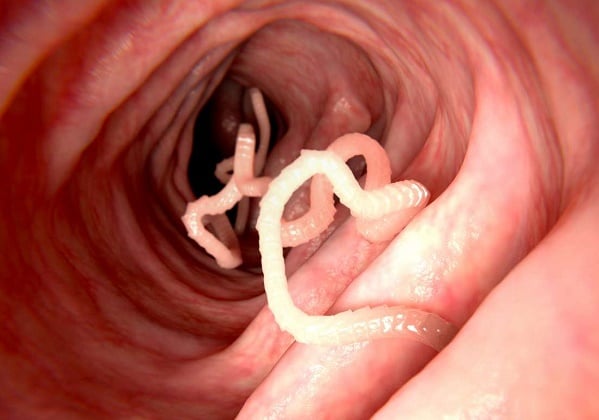Mrs Owokoniran was at a loss. Her son Dapo had worms again. She had treated him for threadworms only last month, and three months before it. She had even fumigated the whole house, scrubbed the floors with bleach and dusted every surface. Dapo’s toys were not spared.
She had painstakingly cleaned them all, one after the other. So why does my child keep getting worms every month, she thought to herself. She decided to talk to her friend, Mrs Aliyu about it. There were meeting for drinks in an hour.
Why Your Child Might Be Getting Recurrent Bouts Of Worms
Both ladies sat in the pretty little cocktail place in Maryland. They made it a point to meet every Thursday and catch up on their lives as moms and wives. They had met a year ago, at a PTA meeting. Both women’s sons attended the same school and were in the same class.
“Has Aminu ever caught worms?”
“Yes o, thankfully those days are over. At the time, it seemed they would never end.”
“Oh! They kept coming back too?” Mrs Owokoniran was excited now. “The same thing is happening to Dapo. This is his third bout of threadworms in 5 months,” she told her friend. “Treating him is not the problem. I just don’t understand why they keep coming back.”
“You’re sure you got rid of them the first time?” Mrs Aliyu asked her friend. She knew only too well how frustrating the thing could be. “Let me share with you what my doctor sister told me.”
“Threadworms lay their eggs around an infected person’s anus (bottom), usually at night. Along with the eggs, the worm also secretes a mucus that causes itching.
If the eggs get stuck on the person’s fingertips when they scratch, they can be transferred to their mouth or on to surfaces and clothes. If other people touch an infected surface, they can then transfer the eggs to their mouth. Once a person is infected, the whole house should undergo treatment.
Threadworm eggs survive for up to 2 weeks before hatching. If the eggs hatch around the anus, the newborn worms can re-enter the bowel. Eggs that have been swallowed will hatch inside the intestine. After 2 weeks, the worms reach adult size and begin to reproduce, starting the cycle again.
So if you’re sure the house is clean, what of at school? Because he is getting infected from somewhere. If it’s not at home, then it is at school.”
“Hmmm”, sighed Mrs Owokoniran. “No wonder it is so tough to get rid of them. I now what the problem may be. Even though I thoroughly clean the house, we only treat Dapo. While I make him wash his hands and observe hygiene, I’m not so strict on his sister. But he plays with her. There’s no telling if her hands have somehow transferred the worms.”
Mrs. Aliyu nodded with a smile. ” You should also talk to their class teacher about it. If a pupil is spreading infections, they should know about it.”
Treating Threadworms
To treat threadworms successfully, all household members must be treated, even if they don’t have any symptoms. This is because the risk of the infection spreading is very high.
The aim of treatment is to get rid of the threadworms and prevent reinfection. This will usually involve a combination of medication to kill the worms and strict hygiene measures to stop the spread of the eggs.
The main medication used to treat threadworms is available from your local pharmacy without a prescription. However, it’s important to follow the manufacturer’s instructions as it isn’t suitable for everyone.
You only need to see your GP if you think:
- you have threadworms and you’re pregnant or breastfeeding
- your child has threadworms and they’re under two years old
This is because the recommended treatment in these circumstances usually isn’t the same as that recommended for most other people.
Hygiene Measures
The lifespan of threadworms is approximately 6 weeks, so it’s important that hygiene measures are followed for at least this length of time. Everyone in the household must follow the advice outlined below.
- wash all night clothes, bed linen, towels and soft toys when you’re first diagnosed. Do this at normal temperatures, but make sure you rinse the washing well
- thoroughly vacuum and dust the whole house, especially the bedrooms. Repeat this regularly.
- carefully clean the bathroom and kitchen, damp-dusting surfaces and washing the cloth frequently in hot water. Do it regularly
- avoid shaking any contaminated material, such as clothing or bed sheets. You don’t want to transfer eggs to other surfaces
- don’t eat food in the bedroom, you may swallow eggs that were shaken off the bedclothes
- keep your fingernails short – encourage other members of your household to do the same
- discourage nail-biting and sucking fingers – in particular, make sure children don’t suck their thumb
- wash your hands frequently and scrub under your fingernails. It’s important to do this before eating, after going to the toilet, and before and after changing your baby’s nappy
- bathe or shower regularly
Children can easily pick up another threadworm infection from friends or at school, so maintaining good hygiene may help prevent reinfection.
This article was first published on AfricaParent.com
Copyright 2025 TheCable. All rights reserved. This material, and other digital content on this website, may not be reproduced, published, broadcast, rewritten or redistributed in whole or in part without prior express written permission from TheCable.
Follow us on twitter @Thecablestyle

